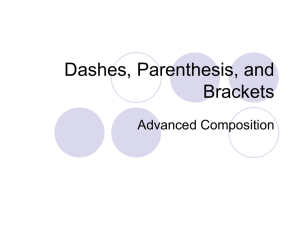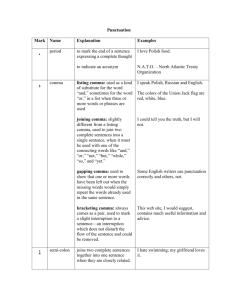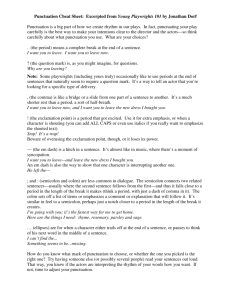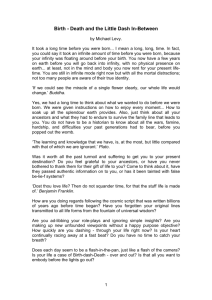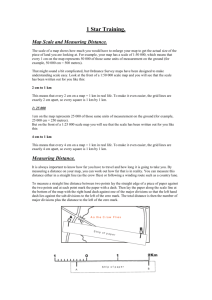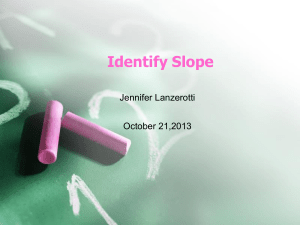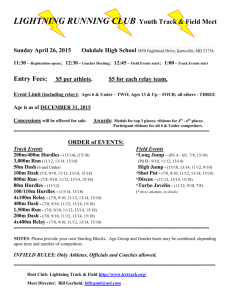English 9
advertisement
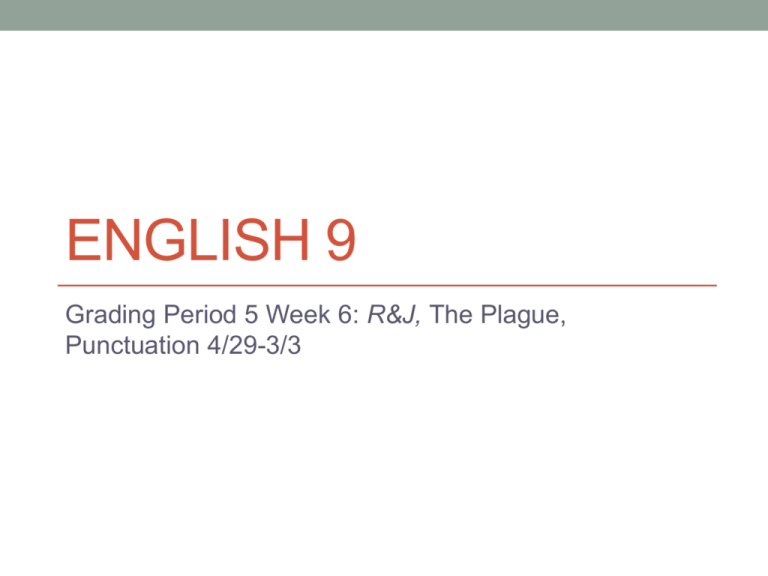
ENGLISH 9 Grading Period 5 Week 6: R&J, The Plague, Punctuation 4/29-3/3 4/29-3/3 Objective Assignments HW Mon Read Drama; Research the Plague WU: Correcting Fragments, ex. 28 1-5 (Writing and Grammar pg. 356) Read Act V, Scene 1 The Plague: art, Giblin article (read and annotate article) Article summary due Wednesday Tues Read drama; research WU: Correcting Fragments, ex. 28 6-10 (Writing and Grammar pg. 356) Read Act V, Scene 2 Finish reading & annotating Giblin Article summary due Wednesday Wed Read drama WU: Correcting Fragments, ex. 30 1-5 (Writing and Grammar pg. 358) Update & complete study guide Dramatic Irony Read Act V, Scene 3 Dramatic Irony handout (Workbook page 251) Thurs Learn dash usage WU: Correcting Fragments, ex. 30 6-10 (Writing and Grammar pg. 358) Dash notes Punctuation Handbook Fri WU and comp book quiz Punctuation Handbook Movie The Culprits From the Toggenburg Bible, 1411 Lancing a Buboe Medieval Art & the Plague Medieval Art & the Plague Bring out your dead! PUNCTUATION MARK NOTES the dashing DASH -- Punctuation: the dash Mark: -- (—) • The dash is used to show INTERRUPTION in a sentence • DASH = INTERRUPTION • Rule #1 A dash indicates a sudden break or abrupt change in the flow of a sentence. • There was a fight at school today— two guys fighting over a girl they both thought was their girlfriend. • In this example, the interruption comes at the end of the sentence, so one dash is needed. Rule #1 “If you don’t listen—oh, forget it—you’ll never figure out this problem.” • If the interruption comes in the middle of the sentence, a dash is used BEFORE and AFTER. • Note that there is a full sentence if the interruption is removed: “If you don’t listen, you’ll never figure out this problem.” Who likes dashes? • POETS LIKE DASHES BECAUSE • • • • • THEY CAN ADD TO THE MEANING OF A POEM WITHOUT ADDING ANY MORE WORDS “breathless” quality “musical” quality A way of emphasizing rhythm & structure A “jerkiness” that gives extra interest to the words In this poem, it gives the sense of the end of life, the last few ragged breaths I heard a Fly buzz (465) by Emily Dickinson I heard a Fly buzz – when I died – The Stillness in the Room Was like the Stillness in the Air – Between the Heaves of Storm The Eyes around – had wrung them dry – And Breaths were gathering firm For that last Onset – when the King Be witnessed – in the Room – I willed my Keepsakes – Signed away What portions of me be Assignable – and then it was There interposed a Fly – With Blue – uncertain stumbling Buzz – Between the light – and me – And then the Windows failed – and then I could not see to see – Rule #2 • A dash sets an explaining or defining phrase from the rest of a sentence. • Sometimes we’ll interrupt ourselves in the middle of a sentence to add more information. This info is set off by dashes. • The symptoms of the plague—vomiting, swollen glands and high fever— struck quickly and caused death within 2-3 days. • Note there is a sentence without the interrupted extra information: “The symptoms of the plague struck quickly and caused death within 2-3 days.” • Note what has been added explains what the symptoms of the plague are: vomiting, swollen glands, high fever • The added information INTERRUPTS the flow of the sentence. Without the interruption, dashes would NOT be used. • I went to school—elementary school, I mean—in Los Angeles. Rule #3 #3. A dash marks an unfinished sentence. • When we are interrupted in the middle of a sentence, it’s shown in writing by using a dash. • “You never give me a chance to—” • “Jim? Why, he is—” He stopped talking and went to thinking. One dash or two? • If the interruption comes in the MIDDLE of the sentence, it must be framed with dashes, so use TWO: • If it doesn’t rain—a good, hard and steady rain, I mean—we will have to ration water very soon. • If the interruption comes at the BEGINNING or END of the sentence, ONE dash is enough: • Complaining—that’s what I hate hearing!! The Dashing Dash-• The dash is a “hip,” edgy punctuation mark • favored by poets and journalists… • So versatile, it can work like colons, parentheses, commas, or semicolons! • The dash can meet almost all your punctuating needs!
